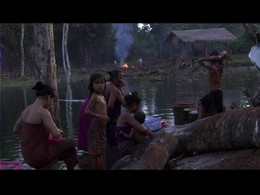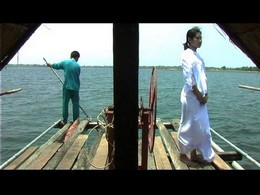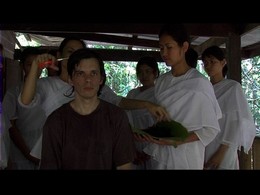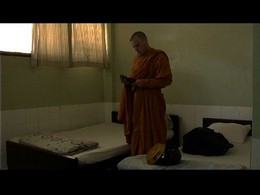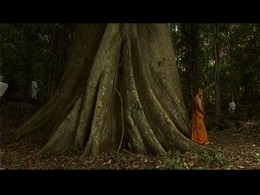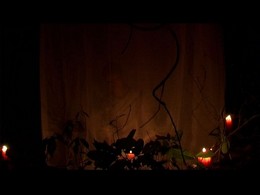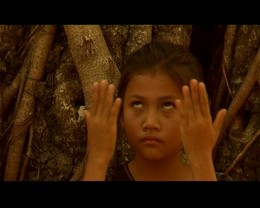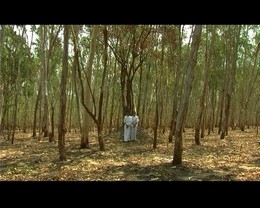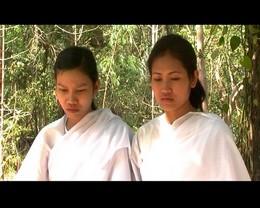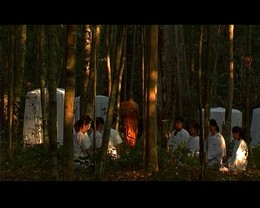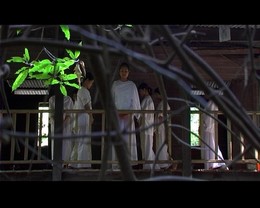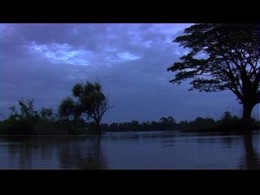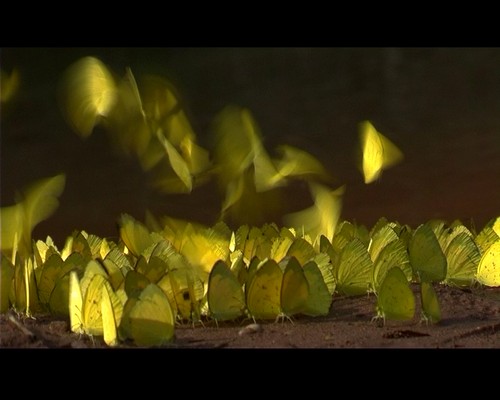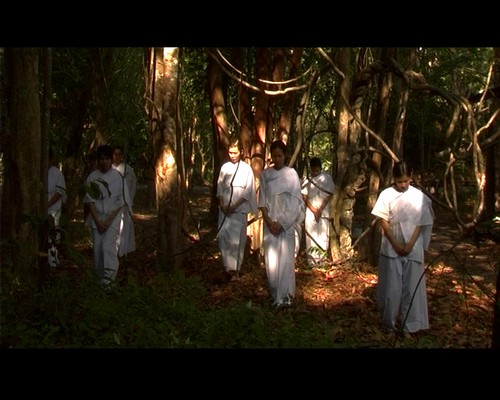Phipop 2005, 90 minutes
Screenplay, director, cinematography and editing : Alain Mazars
Selected in Cannes Film Festival 2005 (ACID) and FIPA 2006.
Synopsis
The diary of a backpacker crossing villages and forests in Laos. The encounter between a beggar and her daughter whose nickname is THE BLIND NUN. The story reminds us of a very weird tale, and our traveler experiences a strange phenomenon of possession. For most Laotians (and for the vast majority of people from South-East Asia), the invisible world of spirits is not an imaginary one but a very real one. With this movie Mazars depictS this Laotian reality, mixing rational, objective facts and events coming from the collective unconscious. He added an element from Laotian culture and from the world of Shamans: the phipop. They are beings who look like ghosts and behave like vampires. They terrorize people living in the cities and in the countryside. The film ask the Western viewer to question what he hears and what he sees: Is it a documentary or a fiction? This is the main theme of the movie.
Press releases
CATALOGUE ACID CANNES. 2005.
Just like the haunted characters of Alain Mazars' movie, we slowly let ourselves go. Little by little, the noise of the city fades away while the sounds and images take possession of us. We then leave our red velvet seats to enter a new world, where forests are as deep as the unconscious. We dream with the movie. We are floating through the woods. We are wrapped in a subtle sensuality as languid voices of Laotian mermaids whisper in our ears the story of the cursed spirits, the Phipops. The voices are enticing, we want to follow them to where those men and women, who are called demons, live. We don't really know where we are anymore, we don't know where we are going, but we are not afraid, it's a pleasant way to get lost. We would like to feel that moment where we leave reality for illusion, reality for fiction. Then we end up admitting that the illusion is also a reality, and believing that it's also a part of those lives. We think that butterflies have sewed shut the eyes of a blind nun or that the spirit of a bonze lives in the body of a young French traveler. One must experience the Phipops, one must see him as well as hear him and follow the maze of a story where sensations count as much as the narrative. In short, you have to let this strange and haunted movie take possession of you, taking the risk of becoming a Phipop viewer. Charles Castella, cinéaste
POLITIS. 16 may 2005.
The public really loves the ACID section this year. In part of course, it is surely the consequence of the success of THE SEA LEVEL IS RISING a movie presented at Cannes last year by ACID. The movie of the day is extremely surprising : PHIPOP, A LAOTIAN STORY, by French director Alain Mazars. The starting point of the movie is the presence of evil spirits (translated from the Laotian PHI) who take possession of human beings. I am not talking about beliefs, but about real presence, because in Laos, that presence is obvious. We as rational Westerners have to watch this movie with an open mind. The invisible, the intangible presences, the spirit world have been totally eradicated from our civilization since, let's say, the disappearance of witches. In Laos, where rumors spread fast and destinies are all intertwined, the spirit world is part of everyday life. Especially in the following way: Some people are accused by their neighbors of being "phipop, which means people who can cast spells. The movie starts like a classic documentary. Alain Mazars goes to a village where people are treated like they have the plague, sick people who are said to have been cursed, or people who have been declared phipops by the angry crowd. But little by little the perspective changes. The director tries to get rid of his Western mindset, and becomes less and less self conscious. He begins to empathize with the local civilization, and the local mindset. As he himself will say in the debate that with follow, Alain Mazars doesn't trust ethnographic movies and their post-colonial innuendos. Which means that he starts believing in spirits. As he says in the voice over: "For me it's about understanding how a spirit can live in a human being. But to answer that question you need to cross a dangerous border. Mazars then switches to a fictional narrative, using characters he met in the first part of the movie, the documentary, and a young backpacker who becomes his main actor. This is a very out-of-the-norm and stimulating movie, which shows how efficient rationality is diminishing our possibilities to relate to the world and to the past (and therefore to the dead). Christophe Katcheff
Pictures
